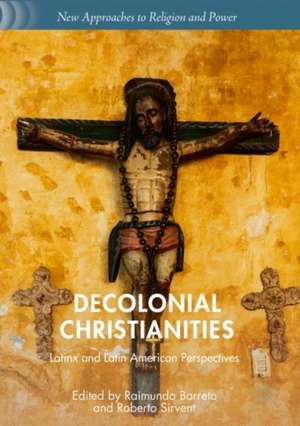Decolonial Christianities: Latinx and Latin American Perspectives: New Approaches to Religion and Power
Editat de Raimundo Barreto, Roberto Sirventen Limba Engleză Paperback – 20 noi 2020
What does it mean to theorize Christianity in light of the decolonial turn? This volume invites distinguished Latinx and Latin American scholars to a conversation that engages the rich theoretical contributions of the decolonial turn, while relocating Indigenous, Afro-Latin American, Latinx, and other often marginalized practices and hermeneutical perspectives to the center-stage of religious discourse in the Americas. Keeping in mind that all religions—Christianity included—are cultured, and avoiding the abstract references to Christianity common to the modern Eurocentric hegemonic project, the contributors favor embodied religious practices that emerge in concrete contexts and communities. Featuring essays from scholars such as Sylvia Marcos, Enrique Dussel, and Luis Rivera-Pagán, this volume represents a major step to bring Christian theology into the conversation with decolonial theory.
| Toate formatele și edițiile | Preț | Express |
|---|---|---|
| Paperback (1) | 740.54 lei 38-44 zile | |
| Springer International Publishing – 20 noi 2020 | 740.54 lei 38-44 zile | |
| Hardback (1) | 784.92 lei 6-8 săpt. | |
| Springer International Publishing – 20 noi 2019 | 784.92 lei 6-8 săpt. |
Din seria New Approaches to Religion and Power
-
 Preț: 197.67 lei
Preț: 197.67 lei - 18%
 Preț: 728.43 lei
Preț: 728.43 lei -
 Preț: 386.81 lei
Preț: 386.81 lei -
 Preț: 381.00 lei
Preț: 381.00 lei -
 Preț: 384.86 lei
Preț: 384.86 lei -
 Preț: 388.72 lei
Preț: 388.72 lei -
 Preț: 395.47 lei
Preț: 395.47 lei -
 Preț: 386.81 lei
Preț: 386.81 lei - 9%
 Preț: 637.59 lei
Preț: 637.59 lei - 15%
 Preț: 524.04 lei
Preț: 524.04 lei - 18%
 Preț: 781.15 lei
Preț: 781.15 lei - 15%
 Preț: 583.93 lei
Preț: 583.93 lei -
 Preț: 187.19 lei
Preț: 187.19 lei - 15%
 Preț: 580.17 lei
Preț: 580.17 lei - 18%
 Preț: 724.94 lei
Preț: 724.94 lei - 18%
 Preț: 784.61 lei
Preț: 784.61 lei - 18%
 Preț: 719.44 lei
Preț: 719.44 lei - 18%
 Preț: 726.23 lei
Preț: 726.23 lei - 5%
 Preț: 370.38 lei
Preț: 370.38 lei -
 Preț: 385.84 lei
Preț: 385.84 lei -
 Preț: 384.86 lei
Preț: 384.86 lei -
 Preț: 381.98 lei
Preț: 381.98 lei -
 Preț: 389.11 lei
Preț: 389.11 lei - 15%
 Preț: 643.34 lei
Preț: 643.34 lei -
 Preț: 386.81 lei
Preț: 386.81 lei -
 Preț: 381.00 lei
Preț: 381.00 lei -
 Preț: 386.81 lei
Preț: 386.81 lei
Preț: 740.54 lei
Preț vechi: 813.78 lei
-9% Nou
Puncte Express: 1111
Preț estimativ în valută:
141.70€ • 148.34$ • 117.25£
141.70€ • 148.34$ • 117.25£
Carte tipărită la comandă
Livrare economică 01-07 aprilie
Preluare comenzi: 021 569.72.76
Specificații
ISBN-13: 9783030241681
ISBN-10: 3030241688
Pagini: 301
Ilustrații: XIII, 301 p. 1 illus.
Dimensiuni: 148 x 210 mm
Ediția:1st ed. 2019
Editura: Springer International Publishing
Colecția Palgrave Macmillan
Seria New Approaches to Religion and Power
Locul publicării:Cham, Switzerland
ISBN-10: 3030241688
Pagini: 301
Ilustrații: XIII, 301 p. 1 illus.
Dimensiuni: 148 x 210 mm
Ediția:1st ed. 2019
Editura: Springer International Publishing
Colecția Palgrave Macmillan
Seria New Approaches to Religion and Power
Locul publicării:Cham, Switzerland
Cuprins
Roberto Sirvent and Raimundo Barreto, Introduction.- 1. Enrique Dussel, Epistemological Decolonization of Theology.- 2. Luis N. Rivera-Pagán, Towards a Decolonial Theology: Perspectives from the Caribbean.- 3. Sylvia Marcos, Mesoamerican Women’s Indigenous Spirituality: Decolonizing Religious Belief.- 4. Jennifer Scheper Hughes, Mapping the Autochthonous Indigenous Church: Toward a Decolonial History of Christianity in las Américas.- 5. Verónica A. Gutiérrez, Indigenous Christianities: Faith, Resilience, and Resistance among the Nahuas in Sixteenth-Century Mexico.- 6. Michel Andraos, “Iglesia Autóctona: An Indigenous Response to Colonial Christianity.- 7. Yountae An, “Decolonizing the Cosmo-Polis: Cosmopolitanism as a Re-humanizing Project.- 8. Néstor Medina, Indigenous Decolonial Movements in Abya Yala and Aztlán, Turtle Island: A Comparison.- 9. Matilde Moros, Inversion and Diasporas: Decolonizing Racialized Sexuality Transnationally.- 10. Ángel F. Méndez Montoya, “¡Sin maricones nohay revoluciones! (Without queering, there’s no revolutioneering!): Mexico’s Queer Subversions of Public Space and the Decolonization of Marriage Heteronormativity.- 11. Nicolás Panotto, A Critique of the Coloniality of theological Knowledge: Rereading Latin American Liberation Theology as Thinking Otherwise.- 12. Elizabeth O’Donnell Gandolfo, Cuando el pobre crea en el pobre: Decolonial Epistemology in the Ecclesial Base Communities of El Salvador.- 13. Ann Hidalgo, Reimagining the Church as a Decolonial Ally: Pedro Casaldáliga’s Liturgies of Repentance.- Cláudio Carvalhaes, A Decolonial Prayer, in lieu of a conclusion.
Notă biografică
Raimundo Barreto is Assistant Professor of World Christianity at Princeton Theological Seminary.
Roberto Sirvent is Professor of Political and Social Ethics at Hope International University in Fullerton, California.
Roberto Sirvent is Professor of Political and Social Ethics at Hope International University in Fullerton, California.
Textul de pe ultima copertă
What does it mean to theorize Christianity in light of the decolonial turn? This volume invites distinguished Latinx and Latin American scholars to a conversation that engages the rich theoretical contributions of the decolonial turn, while relocating Indigenous, Afro-Latin American, Latinx, and other often marginalized practices and hermeneutical perspectives to the center-stage of religious discourse in the Americas. Keeping in mind that all religions—Christianity included—are cultured, and avoiding the abstract references to Christianity common to the modern Eurocentric hegemonic project, the contributors favor embodied religious practices that emerge in concrete contexts and communities. Featuring essays from scholars such as Sylvia Marcos, Enrique Dussel, and Luis Rivera-Pagán, this volume represents a major step to bring Christian theology into the conversation with decolonial theory.
Caracteristici
Addresses questions about how Christianity can still be possible after colonialism and empire Offers an important contribution to the field of decolonial thought by drawing on ecumenical and theological voices Forms a critically constructive conversation which highlights the perspective of decolonial Christianities in North America
